Criminal Law CW-1: Reforming Theft - Taking Without Consent
VerifiedAdded on 2023/01/03
|7
|1347
|22
Report
AI Summary
This report provides an overview of the foundations of criminal law, specifically focusing on the offense of theft as defined by the Theft Act 1968. It examines the actus reus (appropriation, belonging to another, and property) and mens rea (dishonesty and intention to permanently deprive) of theft. The report analyzes the legal issues surrounding the concept of dishonesty in the context of theft, referencing key cases such as R v. Holden, Lawrence v. MPC, and DPP v. Gomez. Furthermore, it explores the arguments presented in an article advocating for the reformation of theft law, highlighting the shift from a focus on dishonesty to a focus on consent. The report contrasts the current legal framework with a proposed definition of theft based on the taking and keeping of property without consent, emphasizing the importance of consent in establishing an offense and the shortcomings of the current law in this regard. It concludes by advocating for a new definition of theft that prioritizes consent and offers a more understandable and common-sense approach to justice.
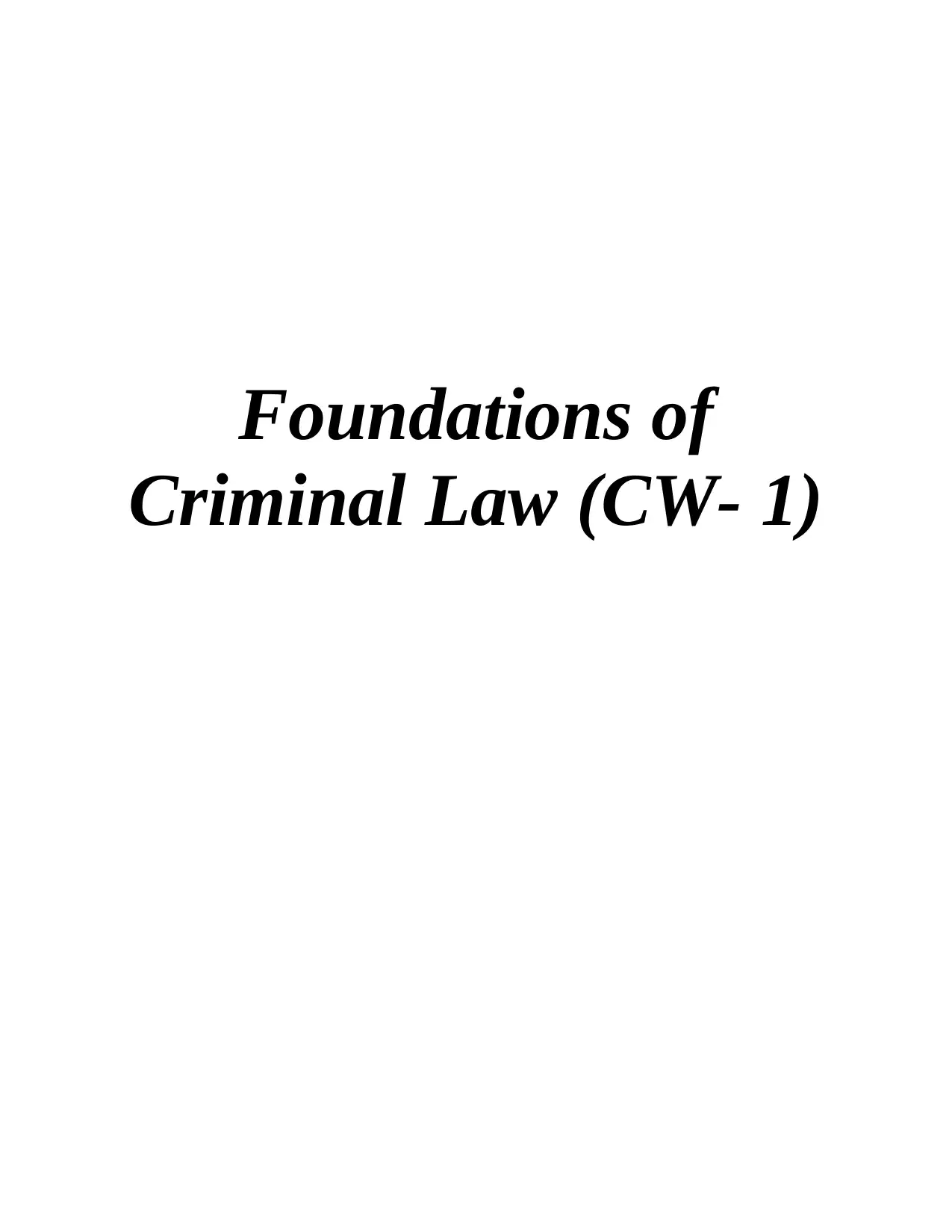
Foundations of
Criminal Law (CW- 1)
Criminal Law (CW- 1)
Paraphrase This Document
Need a fresh take? Get an instant paraphrase of this document with our AI Paraphraser
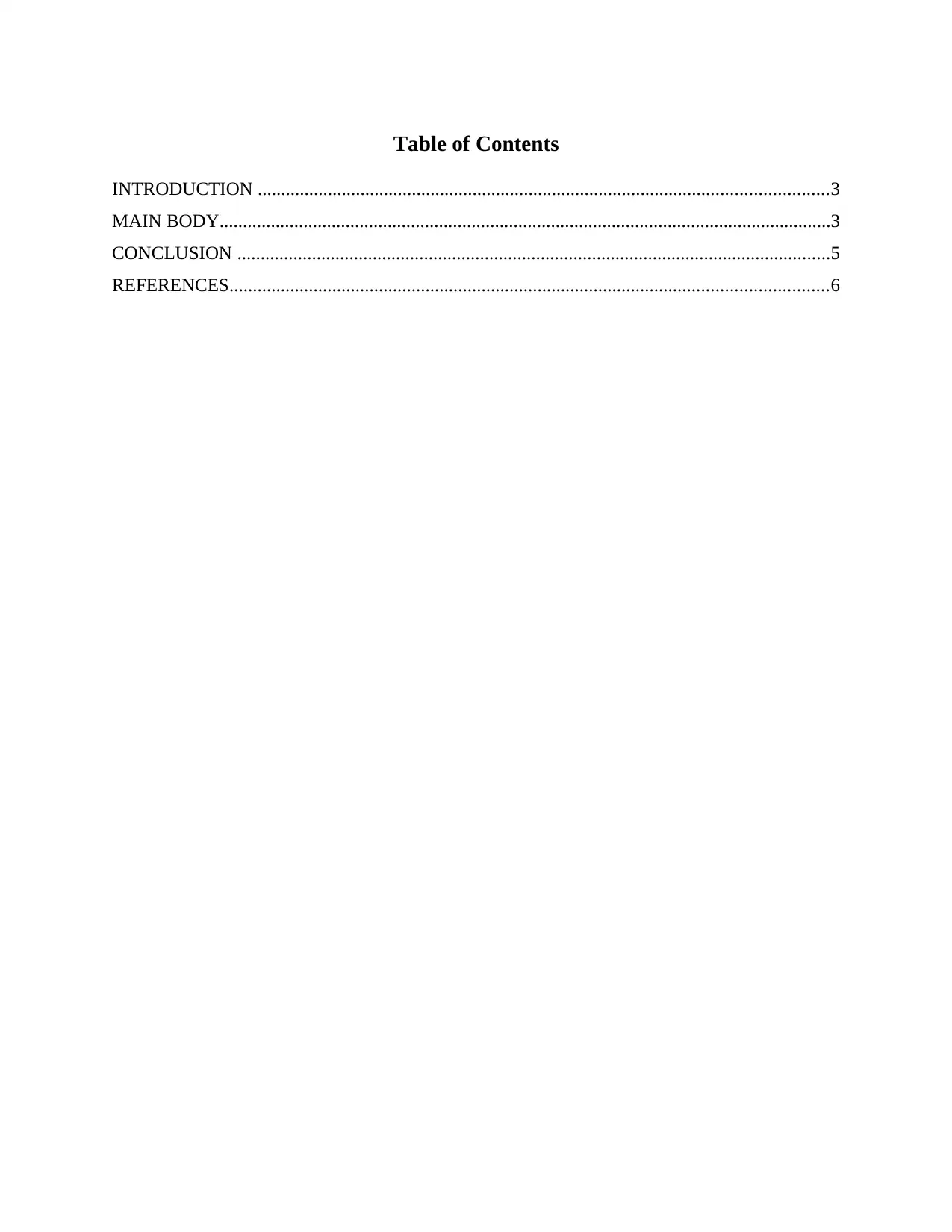
Table of Contents
INTRODUCTION ..........................................................................................................................3
MAIN BODY...................................................................................................................................3
CONCLUSION ...............................................................................................................................5
REFERENCES................................................................................................................................6
INTRODUCTION ..........................................................................................................................3
MAIN BODY...................................................................................................................................3
CONCLUSION ...............................................................................................................................5
REFERENCES................................................................................................................................6
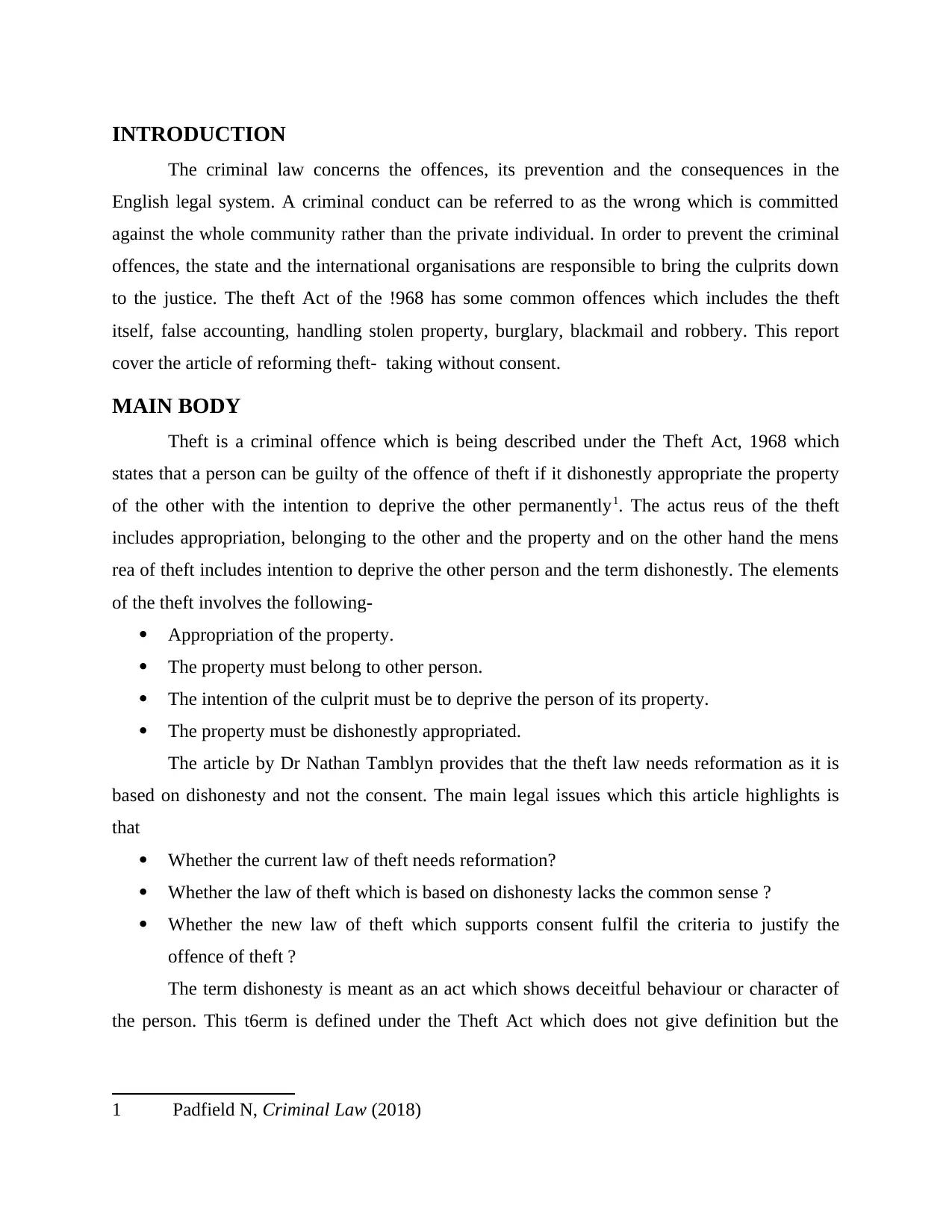
INTRODUCTION
The criminal law concerns the offences, its prevention and the consequences in the
English legal system. A criminal conduct can be referred to as the wrong which is committed
against the whole community rather than the private individual. In order to prevent the criminal
offences, the state and the international organisations are responsible to bring the culprits down
to the justice. The theft Act of the !968 has some common offences which includes the theft
itself, false accounting, handling stolen property, burglary, blackmail and robbery. This report
cover the article of reforming theft- taking without consent.
MAIN BODY
Theft is a criminal offence which is being described under the Theft Act, 1968 which
states that a person can be guilty of the offence of theft if it dishonestly appropriate the property
of the other with the intention to deprive the other permanently1. The actus reus of the theft
includes appropriation, belonging to the other and the property and on the other hand the mens
rea of theft includes intention to deprive the other person and the term dishonestly. The elements
of the theft involves the following-
Appropriation of the property.
The property must belong to other person.
The intention of the culprit must be to deprive the person of its property.
The property must be dishonestly appropriated.
The article by Dr Nathan Tamblyn provides that the theft law needs reformation as it is
based on dishonesty and not the consent. The main legal issues which this article highlights is
that
Whether the current law of theft needs reformation?
Whether the law of theft which is based on dishonesty lacks the common sense ?
Whether the new law of theft which supports consent fulfil the criteria to justify the
offence of theft ?
The term dishonesty is meant as an act which shows deceitful behaviour or character of
the person. This t6erm is defined under the Theft Act which does not give definition but the
1 Padfield N, Criminal Law (2018)
The criminal law concerns the offences, its prevention and the consequences in the
English legal system. A criminal conduct can be referred to as the wrong which is committed
against the whole community rather than the private individual. In order to prevent the criminal
offences, the state and the international organisations are responsible to bring the culprits down
to the justice. The theft Act of the !968 has some common offences which includes the theft
itself, false accounting, handling stolen property, burglary, blackmail and robbery. This report
cover the article of reforming theft- taking without consent.
MAIN BODY
Theft is a criminal offence which is being described under the Theft Act, 1968 which
states that a person can be guilty of the offence of theft if it dishonestly appropriate the property
of the other with the intention to deprive the other permanently1. The actus reus of the theft
includes appropriation, belonging to the other and the property and on the other hand the mens
rea of theft includes intention to deprive the other person and the term dishonestly. The elements
of the theft involves the following-
Appropriation of the property.
The property must belong to other person.
The intention of the culprit must be to deprive the person of its property.
The property must be dishonestly appropriated.
The article by Dr Nathan Tamblyn provides that the theft law needs reformation as it is
based on dishonesty and not the consent. The main legal issues which this article highlights is
that
Whether the current law of theft needs reformation?
Whether the law of theft which is based on dishonesty lacks the common sense ?
Whether the new law of theft which supports consent fulfil the criteria to justify the
offence of theft ?
The term dishonesty is meant as an act which shows deceitful behaviour or character of
the person. This t6erm is defined under the Theft Act which does not give definition but the
1 Padfield N, Criminal Law (2018)
⊘ This is a preview!⊘
Do you want full access?
Subscribe today to unlock all pages.

Trusted by 1+ million students worldwide
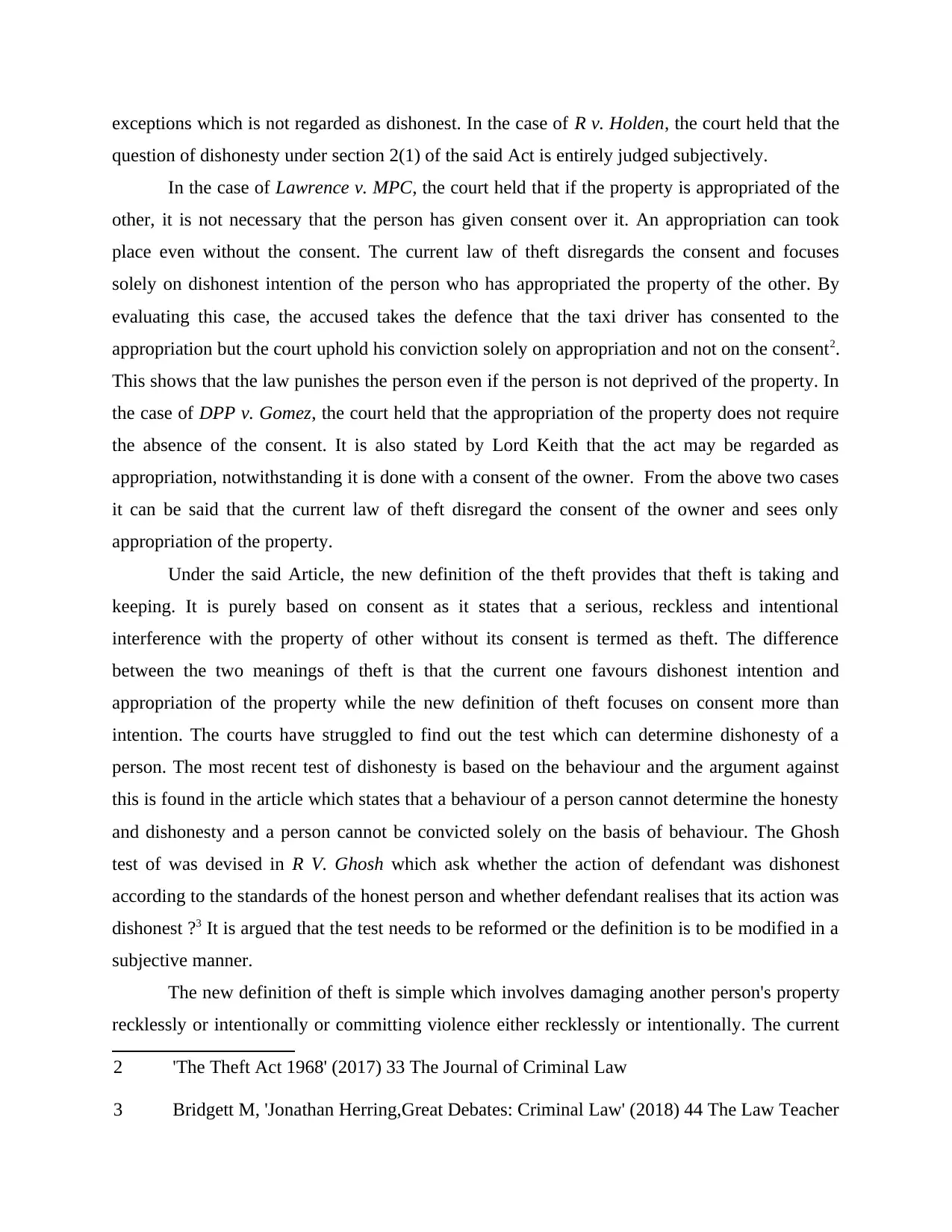
exceptions which is not regarded as dishonest. In the case of R v. Holden, the court held that the
question of dishonesty under section 2(1) of the said Act is entirely judged subjectively.
In the case of Lawrence v. MPC, the court held that if the property is appropriated of the
other, it is not necessary that the person has given consent over it. An appropriation can took
place even without the consent. The current law of theft disregards the consent and focuses
solely on dishonest intention of the person who has appropriated the property of the other. By
evaluating this case, the accused takes the defence that the taxi driver has consented to the
appropriation but the court uphold his conviction solely on appropriation and not on the consent2.
This shows that the law punishes the person even if the person is not deprived of the property. In
the case of DPP v. Gomez, the court held that the appropriation of the property does not require
the absence of the consent. It is also stated by Lord Keith that the act may be regarded as
appropriation, notwithstanding it is done with a consent of the owner. From the above two cases
it can be said that the current law of theft disregard the consent of the owner and sees only
appropriation of the property.
Under the said Article, the new definition of the theft provides that theft is taking and
keeping. It is purely based on consent as it states that a serious, reckless and intentional
interference with the property of other without its consent is termed as theft. The difference
between the two meanings of theft is that the current one favours dishonest intention and
appropriation of the property while the new definition of theft focuses on consent more than
intention. The courts have struggled to find out the test which can determine dishonesty of a
person. The most recent test of dishonesty is based on the behaviour and the argument against
this is found in the article which states that a behaviour of a person cannot determine the honesty
and dishonesty and a person cannot be convicted solely on the basis of behaviour. The Ghosh
test of was devised in R V. Ghosh which ask whether the action of defendant was dishonest
according to the standards of the honest person and whether defendant realises that its action was
dishonest ?3 It is argued that the test needs to be reformed or the definition is to be modified in a
subjective manner.
The new definition of theft is simple which involves damaging another person's property
recklessly or intentionally or committing violence either recklessly or intentionally. The current
2 'The Theft Act 1968' (2017) 33 The Journal of Criminal Law
3 Bridgett M, 'Jonathan Herring,Great Debates: Criminal Law' (2018) 44 The Law Teacher
question of dishonesty under section 2(1) of the said Act is entirely judged subjectively.
In the case of Lawrence v. MPC, the court held that if the property is appropriated of the
other, it is not necessary that the person has given consent over it. An appropriation can took
place even without the consent. The current law of theft disregards the consent and focuses
solely on dishonest intention of the person who has appropriated the property of the other. By
evaluating this case, the accused takes the defence that the taxi driver has consented to the
appropriation but the court uphold his conviction solely on appropriation and not on the consent2.
This shows that the law punishes the person even if the person is not deprived of the property. In
the case of DPP v. Gomez, the court held that the appropriation of the property does not require
the absence of the consent. It is also stated by Lord Keith that the act may be regarded as
appropriation, notwithstanding it is done with a consent of the owner. From the above two cases
it can be said that the current law of theft disregard the consent of the owner and sees only
appropriation of the property.
Under the said Article, the new definition of the theft provides that theft is taking and
keeping. It is purely based on consent as it states that a serious, reckless and intentional
interference with the property of other without its consent is termed as theft. The difference
between the two meanings of theft is that the current one favours dishonest intention and
appropriation of the property while the new definition of theft focuses on consent more than
intention. The courts have struggled to find out the test which can determine dishonesty of a
person. The most recent test of dishonesty is based on the behaviour and the argument against
this is found in the article which states that a behaviour of a person cannot determine the honesty
and dishonesty and a person cannot be convicted solely on the basis of behaviour. The Ghosh
test of was devised in R V. Ghosh which ask whether the action of defendant was dishonest
according to the standards of the honest person and whether defendant realises that its action was
dishonest ?3 It is argued that the test needs to be reformed or the definition is to be modified in a
subjective manner.
The new definition of theft is simple which involves damaging another person's property
recklessly or intentionally or committing violence either recklessly or intentionally. The current
2 'The Theft Act 1968' (2017) 33 The Journal of Criminal Law
3 Bridgett M, 'Jonathan Herring,Great Debates: Criminal Law' (2018) 44 The Law Teacher
Paraphrase This Document
Need a fresh take? Get an instant paraphrase of this document with our AI Paraphraser
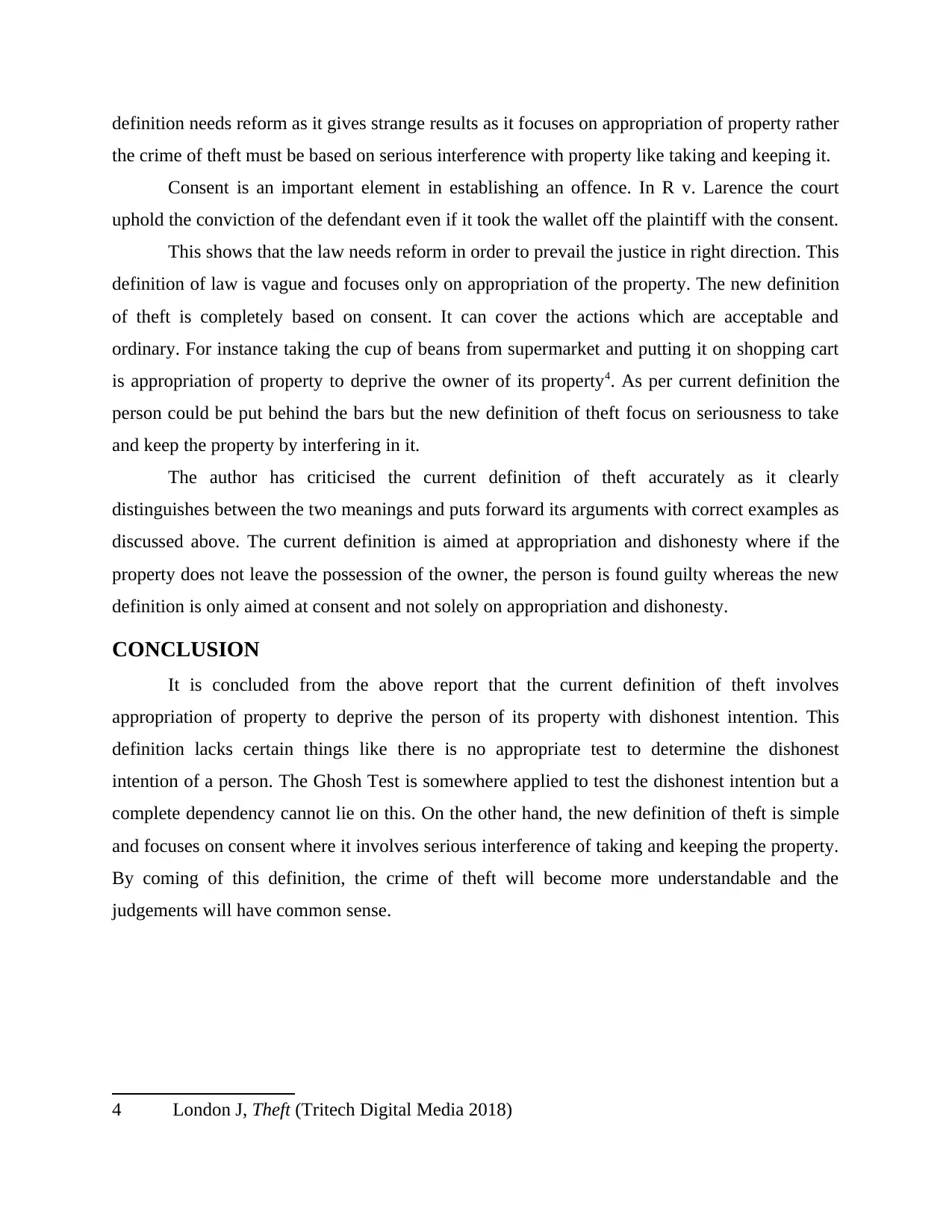
definition needs reform as it gives strange results as it focuses on appropriation of property rather
the crime of theft must be based on serious interference with property like taking and keeping it.
Consent is an important element in establishing an offence. In R v. Larence the court
uphold the conviction of the defendant even if it took the wallet off the plaintiff with the consent.
This shows that the law needs reform in order to prevail the justice in right direction. This
definition of law is vague and focuses only on appropriation of the property. The new definition
of theft is completely based on consent. It can cover the actions which are acceptable and
ordinary. For instance taking the cup of beans from supermarket and putting it on shopping cart
is appropriation of property to deprive the owner of its property4. As per current definition the
person could be put behind the bars but the new definition of theft focus on seriousness to take
and keep the property by interfering in it.
The author has criticised the current definition of theft accurately as it clearly
distinguishes between the two meanings and puts forward its arguments with correct examples as
discussed above. The current definition is aimed at appropriation and dishonesty where if the
property does not leave the possession of the owner, the person is found guilty whereas the new
definition is only aimed at consent and not solely on appropriation and dishonesty.
CONCLUSION
It is concluded from the above report that the current definition of theft involves
appropriation of property to deprive the person of its property with dishonest intention. This
definition lacks certain things like there is no appropriate test to determine the dishonest
intention of a person. The Ghosh Test is somewhere applied to test the dishonest intention but a
complete dependency cannot lie on this. On the other hand, the new definition of theft is simple
and focuses on consent where it involves serious interference of taking and keeping the property.
By coming of this definition, the crime of theft will become more understandable and the
judgements will have common sense.
4 London J, Theft (Tritech Digital Media 2018)
the crime of theft must be based on serious interference with property like taking and keeping it.
Consent is an important element in establishing an offence. In R v. Larence the court
uphold the conviction of the defendant even if it took the wallet off the plaintiff with the consent.
This shows that the law needs reform in order to prevail the justice in right direction. This
definition of law is vague and focuses only on appropriation of the property. The new definition
of theft is completely based on consent. It can cover the actions which are acceptable and
ordinary. For instance taking the cup of beans from supermarket and putting it on shopping cart
is appropriation of property to deprive the owner of its property4. As per current definition the
person could be put behind the bars but the new definition of theft focus on seriousness to take
and keep the property by interfering in it.
The author has criticised the current definition of theft accurately as it clearly
distinguishes between the two meanings and puts forward its arguments with correct examples as
discussed above. The current definition is aimed at appropriation and dishonesty where if the
property does not leave the possession of the owner, the person is found guilty whereas the new
definition is only aimed at consent and not solely on appropriation and dishonesty.
CONCLUSION
It is concluded from the above report that the current definition of theft involves
appropriation of property to deprive the person of its property with dishonest intention. This
definition lacks certain things like there is no appropriate test to determine the dishonest
intention of a person. The Ghosh Test is somewhere applied to test the dishonest intention but a
complete dependency cannot lie on this. On the other hand, the new definition of theft is simple
and focuses on consent where it involves serious interference of taking and keeping the property.
By coming of this definition, the crime of theft will become more understandable and the
judgements will have common sense.
4 London J, Theft (Tritech Digital Media 2018)

⊘ This is a preview!⊘
Do you want full access?
Subscribe today to unlock all pages.

Trusted by 1+ million students worldwide
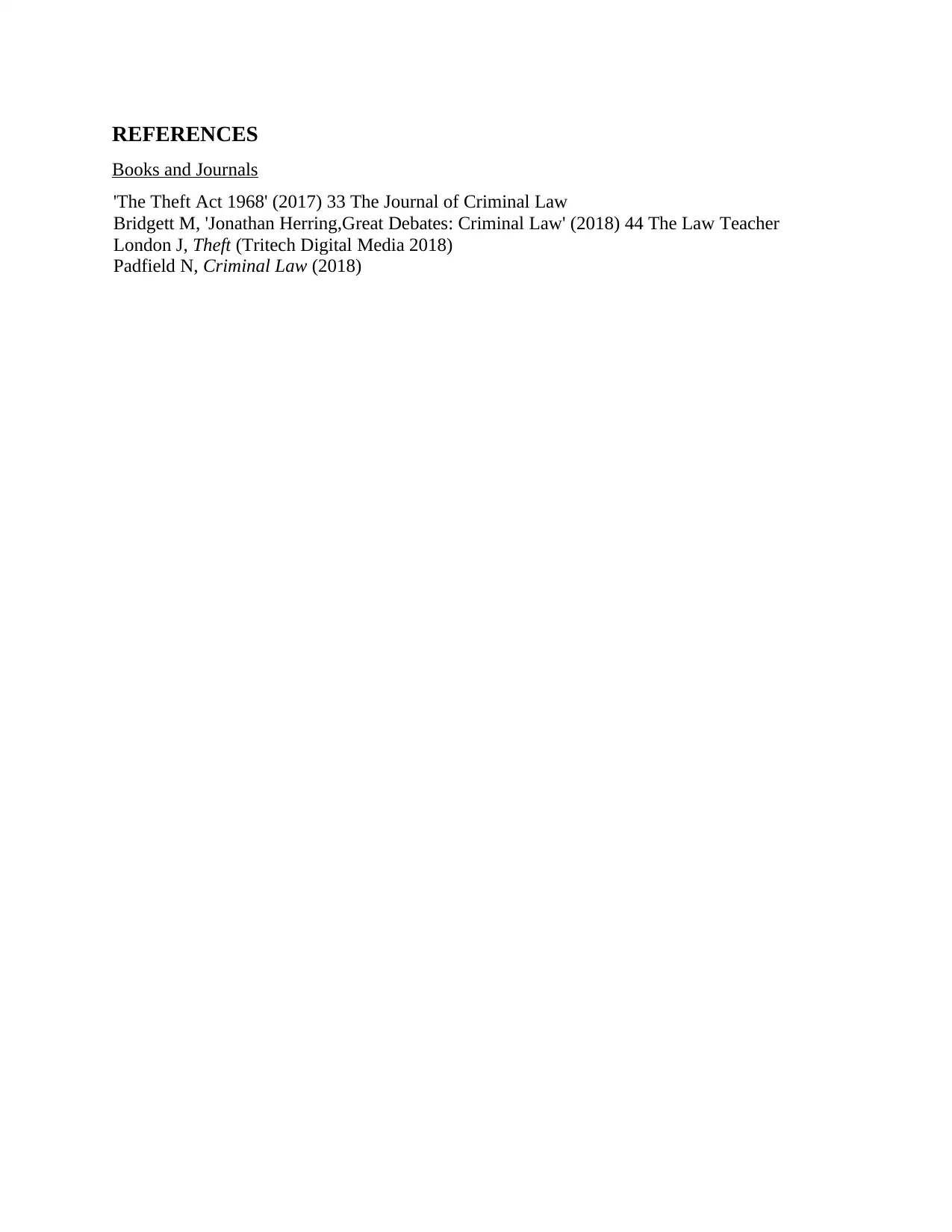
REFERENCES
Books and Journals
'The Theft Act 1968' (2017) 33 The Journal of Criminal Law
Bridgett M, 'Jonathan Herring,Great Debates: Criminal Law' (2018) 44 The Law Teacher
London J, Theft (Tritech Digital Media 2018)
Padfield N, Criminal Law (2018)
Books and Journals
'The Theft Act 1968' (2017) 33 The Journal of Criminal Law
Bridgett M, 'Jonathan Herring,Great Debates: Criminal Law' (2018) 44 The Law Teacher
London J, Theft (Tritech Digital Media 2018)
Padfield N, Criminal Law (2018)
1 out of 7
Related Documents
Your All-in-One AI-Powered Toolkit for Academic Success.
+13062052269
info@desklib.com
Available 24*7 on WhatsApp / Email
![[object Object]](/_next/static/media/star-bottom.7253800d.svg)
Unlock your academic potential
Copyright © 2020–2025 A2Z Services. All Rights Reserved. Developed and managed by ZUCOL.





